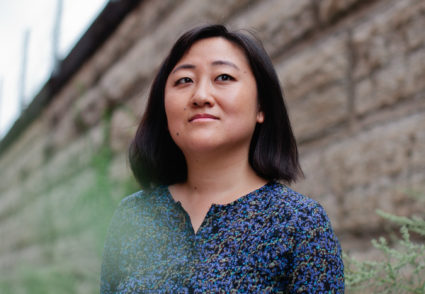
Each year Super Bowl ads offer a snapshot of the American mood — as well as which industries are flush…

Ling Ma, author of our December pick for the NewsHour-New York Times book club, recently answered questions submitted by readers about her novel, "Severance," on Facebook. You'll find a selection of her answers below.
The manuscript initially went by a different working title. One morning, right after waking up, this title came to me, seemingly out of nowhere. I wrote it down in my legal pad. At first I thought it was very appropriate for the novel, then I began to have doubts. I don't like one-word titles for some reason, and that word just seemed kind of severe. In the months I spent finishing up the novel, I kept trying to convince myself that "Severance" was not the title. However, it kept coming back, taking on more resonance, until I couldn't deny it.
I don't know if Candace Chen has clinical depression, but it's possible. She definitely feels resigned in some way. You've probably picked up that she feels ambivalent about her job, as a production coordinator of Bibles, made in China. Your question reminds me of that scene where she hands in her two-week notice before leaving the office, then wanders into this department store in Midtown. She sees these racks of lingerie, with tags showing that they were manufactured in other countries, in similar low-wage labor situations. In that moment she realizes, I think, that whether she quits her job or continues, whether she participates or not, it doesn't make a big difference. The system is so much bigger than she is. This is at least part of the reason she feels so resigned, and maybe why she has this attitude of inaction. I don't necessarily agree with that frame of mind, but it's definitely relatable.
For me, this book began as a meditation on work. I've cycled through various jobs since high school, from shelving library books to making sandwiches to serving as a fact checker. I was thinking about how people reconcile themselves to the type of work that they do, how they make it meaningful for themselves and take pride in it — or don't. I was also partly inspired by the repetitive nature of factory work, like the type of work that Candace observes when she tours the factories in Shenzhen, China.
Since I was a teen, I've held the fantasy of spontaneously quitting jobs, which to me is the fantasy of freedom. During periods of unemployment, I learned that there's no way to inhabit freedom without establishing routines. They break up and change time, create a sense of order and control. They confer meaning. Yet the whole reason I fantasized about quitting is because there are so many jobs with work-related routines that can become suffocating and pointless and flattening.
"Severance" attempts to hold both depictions, and it swerves back and forth between them. Thanks for the close read!
Great question, but daunting to answer! While there were many sources that inspired the novel, I'll just zero in on one aspect here. When I worked at office jobs, I often observed employees bringing up pretty reasonable work-related concerns to management, who would then minimize or dismiss those issues offhand. The company line would typically be, "There are no problems," even when it was so clear to employees that things weren't working. This happened frequently enough, this pretending that the current system is perfectly fine, that it seemed symptomatic of workplace culture.
In writing "Severance," I applied this attitude of denialism to an obvious, undeniable crisis at a larger scale. I think this is why the apocalypse never feels "catastrophic," but non-urgent and anti-climactic. People are encouraged to maintain the status quo. Candace continues going to work as the infrastructure slowly falls apart. The first draft was completed in late summer of 2016, a few months before the election. Despite having written it, I was surprised, like everyone else this past year, at how little government action has been taken during an actual pandemic, and how so many in charge pretended that nothing needed to be changed.
I can't imagine what it must have been like to read "Severance" in 2020. I hope it was worth braving through. In the spring when we first began to quarantine, I did have some moments when I felt unnerved by some parallels between the book and reality, even though they're different. Like the protagonist in "Severance" though, I continued doing my job, which included teaching over Zoom. I would read the news, freak out, then go back to grading or responding to emails. What made the situation more surreal was being sent articles that compared the novel to what was happening in the news. I've never experienced anything like it before.
Sustain our coverage of culture, arts and literature.